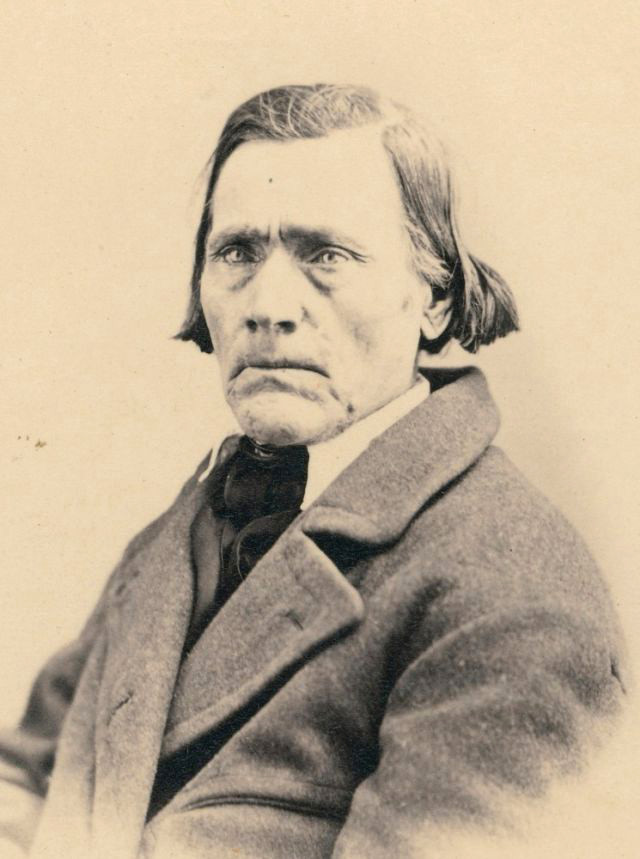Levi Ward Hancock
(1803-1882)


By Susan Easton Black
Levi was an industrious young man. At age fourteen, he opened his woodworking furniture shop. By age nineteen, he had become such a skillful carpenter that his furniture was in demand. From his earnings in woodworking, Levi was able to purchase his father’s property in New York: “The whole land of my Fathers had now become mine save about sixty dollars and no brother could say but what I came honestly by it.”1
In fall of 1830, after he had sold his New York property and moved onto Kirtland, Ohio, his brother Alvah Hancock asked him if he had heard the news. “What news?” asked Levi. His brother replied, “Four men have come and have brought a book with them that they call history and a record of the people that once inhabited this land. . . . They lay hands on those they baptize and bestow on them the Holy Ghost.” As Levi listened to his brother recite his news, he recalled, “There seemed to fall on me something pleasant and delightful. It seemed like a wash of something warm took me in the face and ran over my body which gave me a feeling I cannot describe. The first word I said was, ‘It is the truth, I can feel it.’”2
On November 16, 1830, Levi was baptized by Parley P. Pratt. Following his baptism, Levi “preached from place to place where the folks were well acquainted with me.”3 In a June 7, 1831 revelation given to the Prophet Joseph Smith, he was commanded to journey with Zebedee Coltrin to Missouri (D&C 52:29). In obedience, Levi and Zebedee traveled to Independence, Missouri. There, Levi helped construct the Gilbert and Whitney store and the printing office near the town center.
When he returned to Kirtland, Levi found “all my property was scattered to the four winds, tools and all for pretended claims, where I owed not one cent justly.”4 Unable to show that the pretended claims were unjustified, he had to sell property to cover the debt. This was the beginning of abuse that Levi suffered for his religious beliefs. Yet it was not his abuse that caused his heart to ache. He wrote, “I did all I could do to hold up that good man [Joseph Smith]. My heart would ache for him. He had to stand against thousands of his pretended friends seeking to overthrow him. It was terrible the abuse he suffered.”5
At age thirty, Levi married Clarissa Reed. About a year after their marriage, the Prophet Joseph said to him, “Now that you have a wife, don’t say you can’t go [on the Zion’s Camp march].”6 Believing Joseph needed him on that march, Levi joined the camp. On the march, he played his fife and accompanied Brigham Young and his brother Joseph Young as they sang duets. He also created the flag for the camp. The flag had a white background, an eagle, and the word Peace written in large letters.7
Within six months after Zion’s Camp was disbanded, Levi was appointed one of the Seven Presidents of the Seventy (D&C 124:138-39). For the next forty-seven years, he served in that position. Although he faithfully discharged his ecclesiastical responsibilities, Levi is remembered more for his military prowess. He served as a fife major in the Nauvoo Legion and a police officer in Nauvoo. During the US War with Mexico, Levi was the only General Authority to join the Mormon Battalion and march to California. The soldiers of the Mormon Battalion looked to him as a father figure. After being discharged from his military obligation, Levi joined Latter-day Saints in the Rockies.
He did not reside in the Salt Lake Valley. He lived in Payson, Utah County, before moving to Manti, Sanpete County in 1853. In 1872 he was ordained a patriarch. Ten years later, he died in Washington, Utah, at age seventy-nine.
1. Levi Hancock Autobiography, typescript, p. 21. L. Tom Perry Special Collections, Harold B. Lee Library, Brigham Young University, Provo, UT.
2. Ibid., p. 24.
3. Ibid., p. 26.
4. Ibid. p. 50.
5. Ibid., p. 51.
6. Ibid., p. 53.
7. Ibid., p. 55.
Additional Resources
- Biography of Levi Ward Hancock (josephsmithpapers.org)
